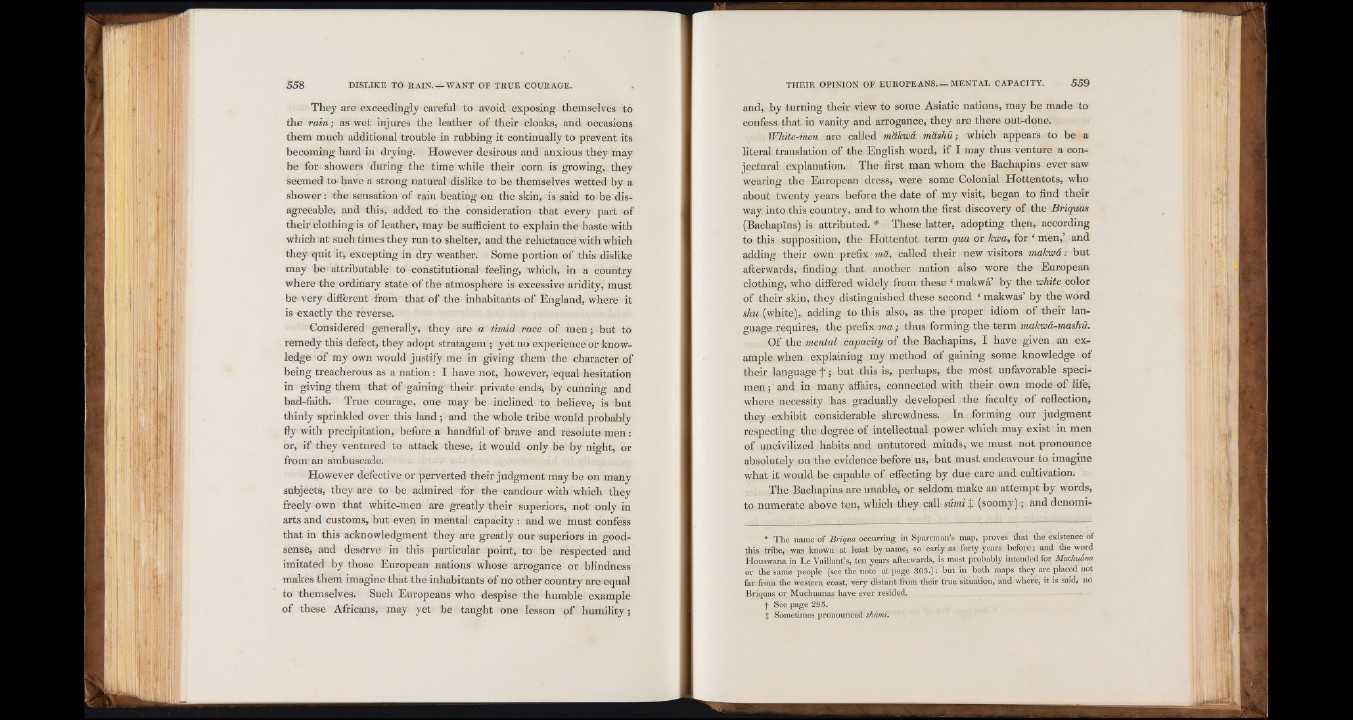
558 DISLIKE TO EAIN. —WANT OF TRUE COURAGE.
They are exceedingly careful to avoid exposing themselves to
the rain; as wet injures the leather of their cloaks, and occasions
them much additional trouble in rubbing it continually to prevent its
becoming hard in drying. However desirous and anxious they may
be for showers during the time while their corn is growing, they
seemed to have a strong natural dislike to be themselves wetted by a
shower: the sensation of rain beating on the skin, is said to be disagreeable,
and this, added to the consideration that every part of
their clothing is of leather, may be sufficient to explain the haste with
which at such times they run to shelter, and the reluctance with which
they quit it* excepting in dry weather. Some portion of this dislike
may be attributable to constitutional feeling, which, in a country
where the ordinary state of the atmosphere is excessive aridity, must
be very different from that of the inhabitants of England, where it
is exactly the reverse.
Considered generally, they are a timid race of men; but to
remedy this defect, they adopt stratagem ; yet no experience or knowledge
of my own would justify me in giving them the character of
being treacherous as a nation: I have not, however, equal hesitation
in giving them that of gaining their private ends, by cunning and
bad-faith. True courage, one may be inclined to believe, is but
thinly sprinkled over this land; and the whole tribe would probably
fly with precipitation, before a handful of brave and resolute men :
or, if they ventured to attack these, it would only be by night, or
from'an ambuscade. .......
However defective or perverted their judgment may be on many
subjects, they are to be admired for the candour with which they
freely own that white-men are greatly their superiors, not only in
arts and customs, but even in mental capacity : and we must confess
that in this acknowledgment they are greatly our superiors in good-
sense, and deserve in this particular point, to be respected and
imitated by those European nations whose arrogance or blindness
makes them imagine that the inhabitants of no other country are equal
to themselves. Such Europeans who despise the humble example
of these Africans, may yet be taught one lesson of humility;
THEIR OPINION OF EUROPEANS MENTAL CAPACITY. 5 5 9
and, by turning their view to some Asiatic nations, may be made to
confess that in vanity and arrogance, they are there out-done.
White-men are called m&lcwd mdshu; which appears to be a
literal translation of the English word, if I may thus venture a conjectural
explanation. The first man whom the Bachapins ever saw
wearing the European dress, were some Colonial Hottentots, who
about twenty years before the date of my visit, began to find their
way into this country, and to whom the first discovery of the Briquas
(Bachapins) is attributed. * These latter, adopting then, according
to this supposition, the Hottentot term qua or kwa, for .* men,’ and
adding their own prefix ■ mti, called their new visitors makwd: but
afterwards, finding that another nation also wore the European
clothing, who differed widely from these ‘ makwa’ by the white color
of their skin, they distinguished these second ‘ makwas’ by the word
shu (white),, adding to this also, as the proper idiom of their language
requires, the prefix ma; thus forming the term makwA-mashu.
Of the mental capacity of the Bachapins, I have given an example
when explaining my method of gaining some knowledge of
their language f ; but this is, perhaps, the most unfavorable specimen
; and in many affairs, connected with their own mode of life,
where necessity has gradually developed the faculty of reflection,
they exhibit considerable shrewdness. In forming our judgment
respecting the degree of intellectual power which may exist in men
of uncivilized habits and untutored minds, we must not pronounce
absolutely on the evidence before us, but must endeavour to imagine
what it would be capable of effecting by due care and cultivation.
The Bachapins are unable, or seldom make an attempt by words,
to numerate above ten, which they call sAmi f (soomy); and denomi-
* The name of Briqua occurring in Sparrman’s map, proves that the existence of
this tribe, was known at least byname, so early as forty years before; and the word
Houswana in Le Vaillant’s, ten years afterwards, is most probably intended for M,uchuina
or the same people (see the note at page SOS.); but'in both maps they are placed not
far from the western coast, very distant from their true situation, and where, it is said, no
Briquas or Muchuanas have ever resided,
f See page 295.
£ Sometimes pronounced shumi.